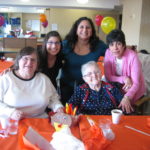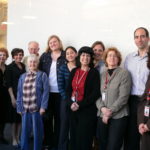This post is by Jennifer Baker, Regional Manager, Service Programs, Greater New York Region
For the past 20 years, the Greater NY Red Cross has been providing Holocaust tracing services through The American Red Cross Holocaust and War Victims Tracing Center, a national clearinghouse for persons seeking the fates of loved ones missing since the Holocaust and its aftermath.
I’ve been involved with the program at the Greater New York Chapter (now the Greater New York Region) since October 2007 and have had the honor to hear people’s stories and help with their journey to find answers about their family.
This program aims to reconnect survivors separated by the Holocaust during World War II, but often it assists U.S. residents, searching for themselves or for family members, in finding information regarding proof of internment, forced/slave labor, or evacuation.
To locate information, we use the worldwide network of more than 185 Red Cross and Red Crescent societies including the Magen David Adom in Israel. We also consult museums, archives and international organizations to further facilitate tracing requests.
As the years pass, sadly, there are fewer survivors to reconnect. Often, the end result of a search is proof of what a survivor endured. This result, though less than what was hoped for, is often invaluable to the person initiating the search.
Six years ago Ruth Schloss opened a case to see if she could learn the fate of her parents. She’d last seen them 70 years earlier, frail and starving, at Camp de Gurs, a work/holding camp in southwestern France, when she was fourteen. Through that search, Ruth learned that her parents died at Auschwitz. Although this was sad news, it provided Ruth with the closure she needed. “I can’t thank the Red Cross enough,” Ruth told my predecessor.
Now, nearly 67 years after the liberation of Auschwitz, fewer and fewer survivors are able to initiate cases themselves. Despite this reality, my team continues to receive new inquiries. The difference is that today, many of these new cases are initiated by the children, and sometimes the grandchildren, of Holocaust survivors.
Most are searching on behalf of elderly parents whose memories or mental states are in decline. That was the situation when Anna Zvi, a Queens, resident and mother of two, initiated a tracing case through the Greater NY Red Cross for her elderly mother, Holocaust survivor Mania Kichell.
Mania’s condition was not the only factor behind Anna’s inquiry. Anna’s daughter Simone helped convince her mother to begin the search; Simone had always thirsted to know more about her grandmother’s Holocaust experiences, but Mania chose not to speak about them.
Zvi and her family were thrilled to receive public records obtained by the Polish Red Cross confirming her mother’s residence in the Lodz Ghetto and liberation from Bergen-Belsen, as well as her mother’s Polish birth certificate.
“The Red Cross relates to people with a lot of heart,” said Zvi. “I’m blessed to have had their help. Having this information means so much to me and to my children.”
This summer the Greater NY Red Cross ran an article about Zvi’s tracing story on our website; it was picked up in September by the Queens Gazette. I’m happy to report that as a result of the Gazette article, a number of new tracing cases have been initiated with my team. Most of these were initiated by individuals who were unaware of our tracing services until reading the article.
Sometimes, though a stroke of luck, a tracing search yields another kind of favorable outcome: Family members are united with relatives by surprise. After Harriet D., the daughter of a survivor, initiated a tracing inquiry on an uncle earlier this year, we concurrently received a tracing request from the Magen David Adom in Israel searching for information on both Harriet’s mother and another uncle. As a result, Harriet was able to connect with a cousin in Israel she didn’t know existed, and relatives in both the U.S. and Israel have reestablished contact.
In my mind, our Holocaust Tracing program is not only an opportunity to find answers, locate lost relatives and potentially bring closure to survivors and their families; it’s a remarkable opportunity to preserve their voices and stories.
As Anna Zvi so eloquently pointed out to me: “My mother is unable to impart this information in her own voice, that’s why I get so emotional when I receive a new piece of documentation. It’s as if someone was speaking for my mother and saying, ‘Yes, she endured this; Yes, we know.’”

